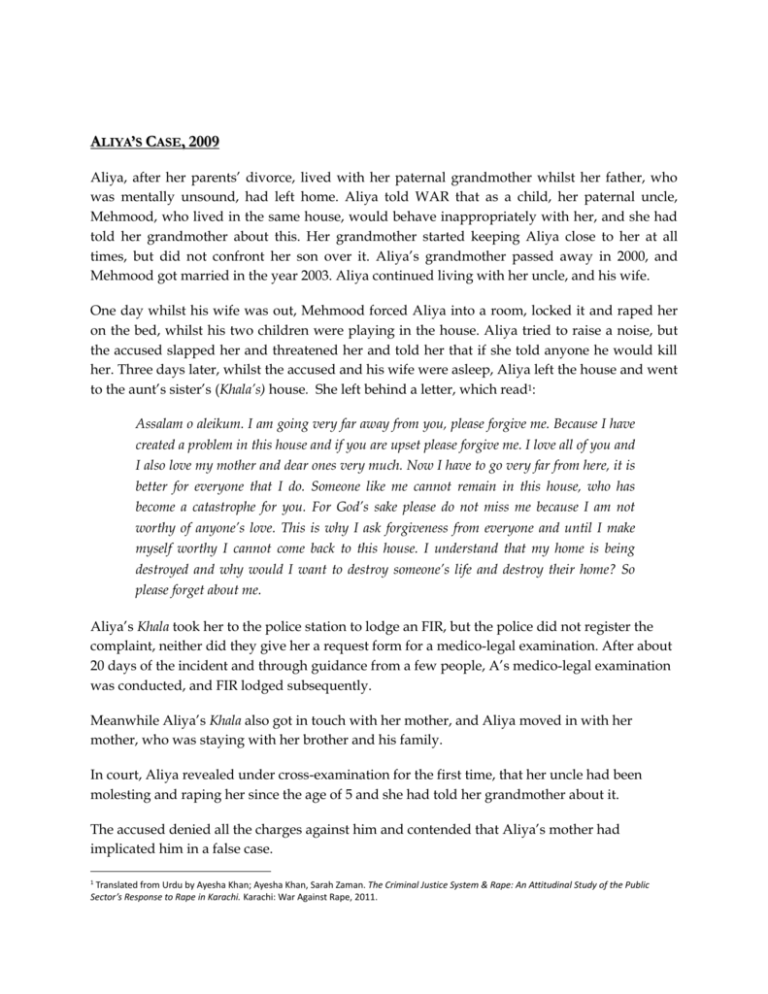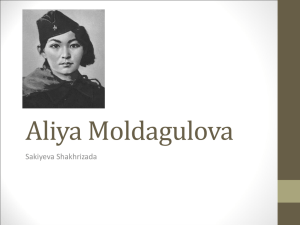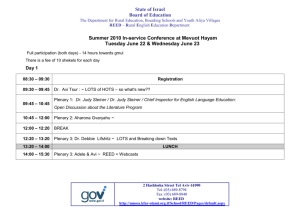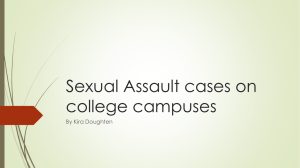Aliya`s Case, 2009
advertisement

ALIYA’S CASE, 2009 Aliya, after her parents’ divorce, lived with her paternal grandmother whilst her father, who was mentally unsound, had left home. Aliya told WAR that as a child, her paternal uncle, Mehmood, who lived in the same house, would behave inappropriately with her, and she had told her grandmother about this. Her grandmother started keeping Aliya close to her at all times, but did not confront her son over it. Aliya’s grandmother passed away in 2000, and Mehmood got married in the year 2003. Aliya continued living with her uncle, and his wife. One day whilst his wife was out, Mehmood forced Aliya into a room, locked it and raped her on the bed, whilst his two children were playing in the house. Aliya tried to raise a noise, but the accused slapped her and threatened her and told her that if she told anyone he would kill her. Three days later, whilst the accused and his wife were asleep, Aliya left the house and went to the aunt’s sister’s (Khala’s) house. She left behind a letter, which read1: Assalam o aleikum. I am going very far away from you, please forgive me. Because I have created a problem in this house and if you are upset please forgive me. I love all of you and I also love my mother and dear ones very much. Now I have to go very far from here, it is better for everyone that I do. Someone like me cannot remain in this house, who has become a catastrophe for you. For God’s sake please do not miss me because I am not worthy of anyone’s love. This is why I ask forgiveness from everyone and until I make myself worthy I cannot come back to this house. I understand that my home is being destroyed and why would I want to destroy someone’s life and destroy their home? So please forget about me. Aliya’s Khala took her to the police station to lodge an FIR, but the police did not register the complaint, neither did they give her a request form for a medico-legal examination. After about 20 days of the incident and through guidance from a few people, A’s medico-legal examination was conducted, and FIR lodged subsequently. Meanwhile Aliya’s Khala also got in touch with her mother, and Aliya moved in with her mother, who was staying with her brother and his family. In court, Aliya revealed under cross-examination for the first time, that her uncle had been molesting and raping her since the age of 5 and she had told her grandmother about it. The accused denied all the charges against him and contended that Aliya’s mother had implicated him in a false case. 1 Translated from Urdu by Ayesha Khan; Ayesha Khan, Sarah Zaman. The Criminal Justice System & Rape: An Attitudinal Study of the Public Sector’s Response to Rape in Karachi. Karachi: War Against Rape, 2011. The medical evidence showed that Aliya, who was 14/15 years old at the time, and had not reached puberty yet, had been engaged in sexual intercourse. There were no marks of violence or semen found, as the medical exam was conducted 20 days after the incident. Whilst the prosecution put forwards Aliya’s testimony as confidence inspiring, and cited that “there was no reason why a 14 years old girl will involve her real paternal uncle in such a heinous crime without any whim and reason which may also cause disgraceful for her”[sic]. Counsel for accused suggested that the delay in the lodging of FIR allowed the survivor and her family to fabricate the story against the accused to settle an old score as her mother was divorced by the brother of the accused. The defence presented no other evidence, and the accused did not testify under oath. The court held that the letter that Aliya had left at the accused’s house “put blame to no one but to her because she felt frustrated due to her lack [of] sexual look” [sic]2. Furthermore, the court found it unbelievable that a girl at age 5 would tolerate sexual assault and tell no one, except her grandmother. The court held that, “The victim had been changing the number of sexual assaults with her on each of the statements, and from the letter she left at the house of the accused, she seems to be sexually frustrated and further that the medical evidence about the rape remains inconclusive ... The benefit of the doubt is therefore in favour of the accused.” Aliya now lives with her mother at her uncles’ house with him and his family. Her mother now of some age, is ill and unable to work. In order to support herself and her mother, Aliya works at a school in, Karachi, earning Rs. 1000 per month. Aliya is hoping to enrol to give her matric examinations in 2012. Like most survivors of incest Aliya battles to come to terms with the betrayal of trust by the perpetrator. As she told WAR in an interview, “Chachu (paternal uncle) is supposed to be like a father; it is a relation of respect. He used to tell me himself that I should call him “papa” (father) but then he raped me as well”. To contribute to Aliya’s education, or support her daily struggle, Click here. 2 At Para 17 of Reasons for Judgment.









